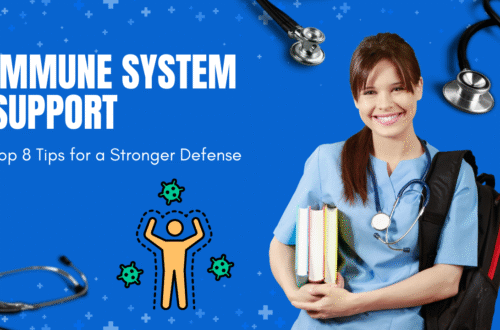Eating nutritious food is the foundation of good health. It affects your energy levels, mood, immunity, body weight, and even longevity. In today’s fast-paced world filled with convenience foods and conflicting dietary advice, understanding how to make smarter food choices has become more important than ever. This article will guide you through everything you need to know about eating nutritious food — from the basic principles to practical tips — and provide the Top 8 tips to help you create lifelong healthy eating habits.
What Is Nutritious Food?

Nutritious food is any type of food that provides the essential nutrients your body needs to stay healthy and function efficiently. These nutrients include proteins, carbohydrates, fats, vitamins, minerals, fiber, and water. Each of these components plays a unique role in maintaining your body’s energy levels, supporting growth and repair, and strengthening the immune system.
Incorporating a variety of nutritious foods into your daily diet ensures that you receive a balanced intake of macronutrients and micronutrients. Whole foods like fruits, vegetables, legumes, lean meats, dairy, and whole grains are all excellent sources of nutrition. These foods are generally lower in added sugars and unhealthy fats, making them better for long-term health.
Choosing nutritious food over processed or fast food options not only helps prevent chronic diseases but also supports better digestion, sharper mental focus, and sustained energy. A nutrient-rich diet is one of the most effective ways to maintain your overall well-being.
- Macronutrients: Carbohydrates, proteins, and fats
- Micronutrients: Vitamins and minerals
- Water: Vital for every cell and organ
- Fiber: Supports digestion and heart health
A nutritious diet includes a wide variety of whole, minimally processed foods like fruits, vegetables, whole grains, lean proteins, healthy fats, and plenty of water. It also avoids excess sugar, salt, and unhealthy fats.
Why Nutritious Food Matters
Your body depends on nutritious food to carry out essential functions like breathing, thinking, moving, and repairing tissues. Without the right balance of nutrients, your body struggles to maintain energy levels and support vital processes. Proper nutrition ensures that your organs, muscles, and brain work efficiently.
Eating a variety of nutritious foods helps strengthen the immune system, improve mental clarity, and support emotional well-being. Nutrient-rich meals enhance digestion, reduce inflammation, and contribute to a healthier metabolism. These benefits are especially important in preventing fatigue and maintaining a balanced mood throughout the day.
In the long term, a consistent intake of nutritious food can lower your risk of chronic illnesses such as diabetes, heart disease, and obesity. It also helps with maintaining a healthy weight, improving sleep, and boosting overall quality of life. Simply put, food is not just fuel—it’s a critical tool for lifelong health and wellness.
- Strengthen your immune system
- Support mental clarity and emotional well-being
- Improve digestion and gut health
- Help maintain healthy weight
- Reduce the risk of chronic diseases like diabetes, heart disease, and cancer
- Enhance energy levels and sleep quality
Poor eating habits, on the other hand, contribute to fatigue, illness, mental fog, and lifestyle diseases.
Top 8 Tips: How to Eat Nutritious Food
1. Eat a Variety of Whole Foods
One of the most important principles of a healthy lifestyle is eating a variety of nutritious food. When your meals include different food groups, you’re more likely to receive a full spectrum of essential nutrients. Diversity in your diet ensures that your body gets everything it needs to function at its best.
Whole foods like fruits, vegetables, legumes, whole grains, and lean proteins are excellent examples of nutritious food. These options are naturally rich in vitamins, minerals, fiber, and antioxidants that support energy, digestion, and immunity. Unlike processed foods, they are minimally altered and free from unnecessary additives.
Try to include a wide range of colors in your meals — known as “eating the rainbow.” Each color group in fruits and vegetables represents different nutrients. By focusing on colorful, nutritious food, you can build a balanced diet that supports long-term health and helps prevent nutrient deficiencies.
Tip: Try to “eat the rainbow” by including colorful vegetables and fruits in every meal. Each color offers different nutrients — for example, orange foods like carrots are high in beta-carotene, while leafy greens provide calcium and vitamin K.
2. Balance Your Macronutrients

Every meal should offer a healthy balance of macronutrients—carbohydrates, proteins, and fats. These three components provide the energy and building blocks your body needs for daily activities, growth, and repair. A well-balanced plate made up of nutritious food supports metabolism, muscle health, and brain function.
Carbohydrates, especially from whole grains, fruits, and vegetables, are the body’s primary energy source. Proteins from nutritious foods like lean meats, legumes, eggs, and tofu help rebuild tissues and support the immune system. Healthy fats, found in nuts, seeds, avocados, and olive oil, are essential for brain health and hormone regulation.
Including all three macronutrients in your meals helps you feel full longer and avoid energy crashes. Choosing whole, nutritious food over processed alternatives ensures you’re fueling your body with quality nutrients rather than empty calories. Striking the right balance at every meal is key to sustaining energy and long-term health.
- Carbohydrates: Your body’s main energy source. Choose complex carbs like brown rice, oats, quinoa, and whole wheat bread.
- Proteins: Essential for muscle repair and hormone production. Include lean meats, beans, tofu, eggs, or fish.
- Fats: Needed for brain function and cell health. Go for healthy fats found in nuts, seeds, olive oil, and avocados.
Tip: Avoid highly processed foods that are high in sugar and unhealthy fats. These offer little nutrition and can spike your blood sugar.
3. Read Nutrition Labels
Understanding food labels is a powerful step toward choosing more nutritious food. Labels provide valuable information about what’s inside the product, helping you avoid hidden sugars, excess sodium, and unhealthy fats that can sabotage your health goals.
Start by checking the serving size, calories per serving, and the amounts of fats, carbohydrates, sugars, protein, and fiber. When choosing nutritious food, aim for products that are high in fiber, protein, and essential vitamins while being low in added sugars and saturated fats.
Also, pay attention to the ingredients list. The shorter and more recognizable the list, the better. If sugar or artificial additives are listed among the first few ingredients, the item is likely not a truly nutritious food choice. Reading labels empowers you to make informed decisions and build a diet that supports your energy, health, and well-being.
- Serving size
- Calories per serving
- Amounts of sugar, saturated fat, sodium
- Daily value percentages (%DV) for key nutrients
Tip: Choose products with higher fiber, lower sugar, and minimal additives. Avoid items with unfamiliar ingredients or long ingredient lists.
4. Cook at Home More Often
Preparing meals at home allows you to take full control over the ingredients, cooking methods, and portion sizes. This gives you a greater chance of consistently choosing nutritious food that supports your health goals. You can select whole, fresh ingredients and avoid unnecessary additives.
Unlike restaurant or take-out meals, which often contain hidden sugars, unhealthy fats, and high levels of sodium, home-cooked dishes can be tailored to your dietary needs. By cooking at home, you can use healthier oils, reduce salt, and add more vegetables or lean proteins to increase the overall nutritional value.
Making your own meals also encourages mindful eating and better habits. When you prepare your own nutritious food, you’re more likely to appreciate what goes into it and make balanced choices. Over time, this builds a strong foundation for healthier eating and a lifestyle that prioritizes nutrition and well-being.
Tip: Try meal prepping. Spend a few hours on the weekend chopping veggies, cooking grains, and portioning meals. It saves time and makes it easier to eat healthily throughout the week.
5. Stay Hydrated with Water

Water is a vital but often overlooked component of a healthy diet. While much focus is placed on eating nutritious food, staying hydrated is just as important. Water plays a critical role in nearly every bodily function, including nutrient absorption and circulation.
Proper hydration helps transport nutrients from the nutritious food you consume to the cells that need them. It also helps regulate your body temperature, support digestion, and flush out toxins that could otherwise build up and affect your health. Without enough water, your body can’t efficiently use the nutrients you take in.
Drinking water throughout the day supports metabolism and energy levels. It also helps prevent overeating by reducing false hunger signals. Pairing water with a diet rich in nutritious food ensures your body has everything it needs to function optimally and maintain long-term health and vitality.
Tip: Aim for 6–8 glasses of water a day. Drink more if you exercise or live in a hot climate. Herbal teas and water-rich foods like cucumbers and melons also help.
6. Limit Processed and Sugary Foods
Highly processed foods are one of the biggest obstacles to a healthy diet. Unlike nutritious food, these items are often stripped of their natural nutrients and loaded with added sugars, unhealthy fats, artificial additives, and preservatives. While they may be convenient, they offer little in terms of real nourishment.
Relying heavily on processed foods can lead to excessive calorie intake without providing the essential vitamins and minerals your body needs. Over time, this kind of diet may contribute to weight gain, increased inflammation, and a higher risk of developing chronic conditions such as diabetes, heart disease, and certain cancers.
Replacing processed items with whole, nutritious food like fresh fruits, vegetables, whole grains, and lean proteins can significantly improve your health. These foods are naturally rich in nutrients and support better energy, digestion, and immune function. Making the switch to more wholesome choices is a powerful step toward long-term wellness.
Tip: Shop the perimeter of the grocery store where fresh foods are usually found. Read ingredient labels and avoid products with sugar listed in the first few ingredients.
7. Listen to Your Body’s Hunger and Fullness Cues
Mindful eating is an important practice that helps you connect with your body and make better food choices. When you focus on eating nutritious food slowly and attentively, you become more aware of hunger cues and avoid overeating. This awareness can improve digestion and satisfaction.
Savoring each bite allows you to fully enjoy the flavors and textures of your meal. This not only enhances your eating experience but also encourages you to choose more wholesome, nutritious food that nourishes your body. Taking time during meals helps prevent rushed eating, which often leads to consuming excess calories.
Stopping when you feel about 80% full is a simple yet effective strategy. It prevents discomfort and supports healthy weight management by respecting your body’s natural signals. Incorporating mindful eating with a focus on nutritious food creates a balanced, sustainable approach to your overall nutrition and wellness.
Tip: Don’t eat just because food is there. Learn to distinguish between true hunger and emotional cravings. Drink a glass of water if you’re unsure — sometimes thirst is mistaken for hunger.
8. Make Nutrition a Lifestyle, Not a Diet
Fad diets often promise rapid weight loss or quick fixes, but they rarely provide lasting health benefits. These diets can be overly restrictive or unbalanced, making it difficult to maintain them long term. Instead of relying on fad diets, focusing on consistent consumption of nutritious food is key to achieving sustainable health.
Adopting a lifestyle centered around nutritious food means making choices that nourish your body and support your well-being over time. This approach promotes balanced eating habits rather than temporary restrictions. By choosing whole, nutrient-rich foods, you provide your body with the fuel it needs for energy, growth, and repair.
Sustainable nutrition isn’t about quick fixes—it’s about creating habits that last a lifetime. Prioritizing nutritious food helps you maintain a healthy weight, prevent chronic diseases, and feel your best every day. Making this shift encourages a positive, realistic relationship with food and overall health.
Tip: Allow for flexibility. It’s okay to enjoy treats occasionally. Focus on progress, not perfection. A balanced approach to nutrition leads to better consistency and long-lasting results.
The Role of Micronutrients
Micronutrients—vitamins and minerals—are just as important as macronutrients. They play critical roles in everything from bone health (calcium, vitamin D) to immunity (vitamin C, zinc) and blood health (iron, vitamin B12).
Tip: To meet your needs, eat a colorful variety of fruits, vegetables, whole grains, and protein sources. If you suspect a deficiency, consult your doctor or a nutritionist.
Superfoods That Support Nutrition
Some foods are packed with higher concentrations of nutrients and are often called “superfoods.” Examples include:
- Berries (rich in antioxidants)
- Leafy greens (vitamins A, C, K)
- Salmon (omega-3 fatty acids)
- Chia seeds (fiber, protein, healthy fats)
- Yogurt (probiotics and calcium)
While no single food can meet all your nutritional needs, including more of these nutrient-dense options can enhance your diet.
Meal Planning and Smart Shopping

Plan your meals and make grocery lists based on whole foods. This prevents impulsive buying and ensures you always have healthy options available.
Tips for smart grocery shopping:
- Don’t shop when you’re hungry
- Stick to your list
- Choose seasonal produce for better taste and value
- Compare labels for healthier options
Overcoming Common Challenges
Even with the best intentions, obstacles can arise:
- Busy lifestyle: Keep healthy snacks on hand like nuts, fruit, or yogurt
- Budget concerns: Buy in bulk, choose store brands, and freeze leftovers
- Picky eaters: Try different preparations or mix vegetables into favorite dishes
Small changes add up over time. The key is consistency and finding what works for you.
Conclusion: A Lifetime of Better Nutrition
Eating nutritious food isn’t about perfection—it’s about making informed, balanced choices that nourish your body and support your well-being. By understanding the basics of nutrition and applying simple, practical tips, you can build habits that last a lifetime.
Focus on whole foods, variety, balance, and mindfulness. Listen to your body, plan ahead, and stay flexible. The benefits of eating nutritious food go far beyond your plate — they touch every part of your life.
Final Thought on Nutritious Food
Nutritious food is the cornerstone of good health and vitality. It goes far beyond simply filling the stomach — it provides the essential nutrients your body needs to function optimally every day. From supporting brain function and boosting energy levels to strengthening the immune system and aiding in tissue repair, the impact of a nutrient-rich diet touches every part of your life.
In today’s fast-paced world, it’s easy to fall into the trap of convenience foods and fad diets that promise quick results but often lack the necessary nutrients for long-term wellness. Choosing whole, unprocessed, and diverse nutritious food helps you build a strong foundation for lasting health. By including a wide variety of colorful fruits, vegetables, whole grains, lean proteins, and healthy fats, you ensure that your body receives a balanced supply of vitamins, minerals, fiber, and antioxidants.
Equally important is cultivating mindful eating habits—listening to your body’s hunger and fullness signals, savoring your meals, and making conscious choices that respect your well-being. Hydration, regular physical activity, and avoiding harmful substances like excessive processed foods or tobacco also play vital roles in enhancing the benefits of nutritious eating.
Ultimately, nutritious food is not a diet or a short-term fix; it is a lifelong commitment to caring for yourself. When you prioritize nutrition in your daily life, you’re investing in your energy, mood, longevity, and overall quality of life. Making small, consistent choices toward more wholesome foods empowers you to live healthier, happier, and more vibrant every day.
1. What is nutritious food?
Nutritious food refers to foods that provide essential nutrients like vitamins, minerals, protein, healthy fats, and fiber that the body needs to function properly and maintain good health.
2. Why is eating nutritious food important?
Eating nutritious food supports energy levels, immune function, brain health, and overall well-being. It helps prevent chronic diseases and promotes a healthy weight.
3. How can I identify nutritious food?
Look for whole, minimally processed foods like fruits, vegetables, whole grains, lean proteins, nuts, and seeds. Avoid foods high in added sugars, unhealthy fats, and artificial ingredients.
4. How often should I eat nutritious food?
Nutritious food should be the foundation of every meal and snack. Aim to include a variety of nutrient-dense foods daily for balanced nutrition.
5. Can nutritious food help with weight management?
Yes, because nutrient-rich foods often contain fiber and protein, which promote fullness and reduce overeating, helping support healthy weight management.
6. Are all fats unhealthy?
No. Healthy fats from sources like avocados, nuts, seeds, and olive oil are essential for brain function and hormone production. Limit saturated and trans fats.
7. How does water relate to nutritious food?
Water aids digestion, nutrient transport, and toxin removal. Drinking enough water enhances the benefits of nutritious food.
8. Can processed foods ever be nutritious?
Some minimally processed foods, like frozen vegetables or canned beans without added salt or sugar, can be nutritious options. Always check labels carefully.




